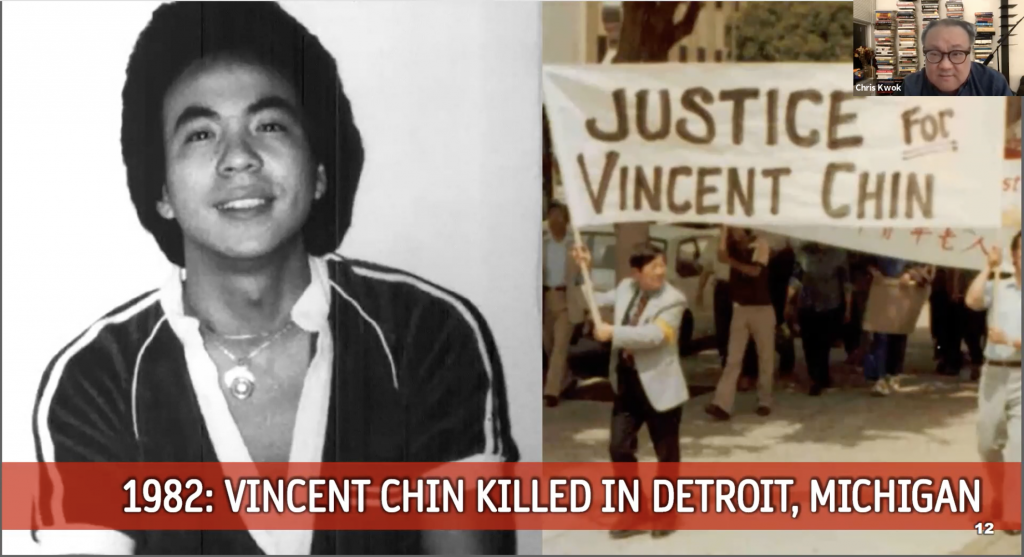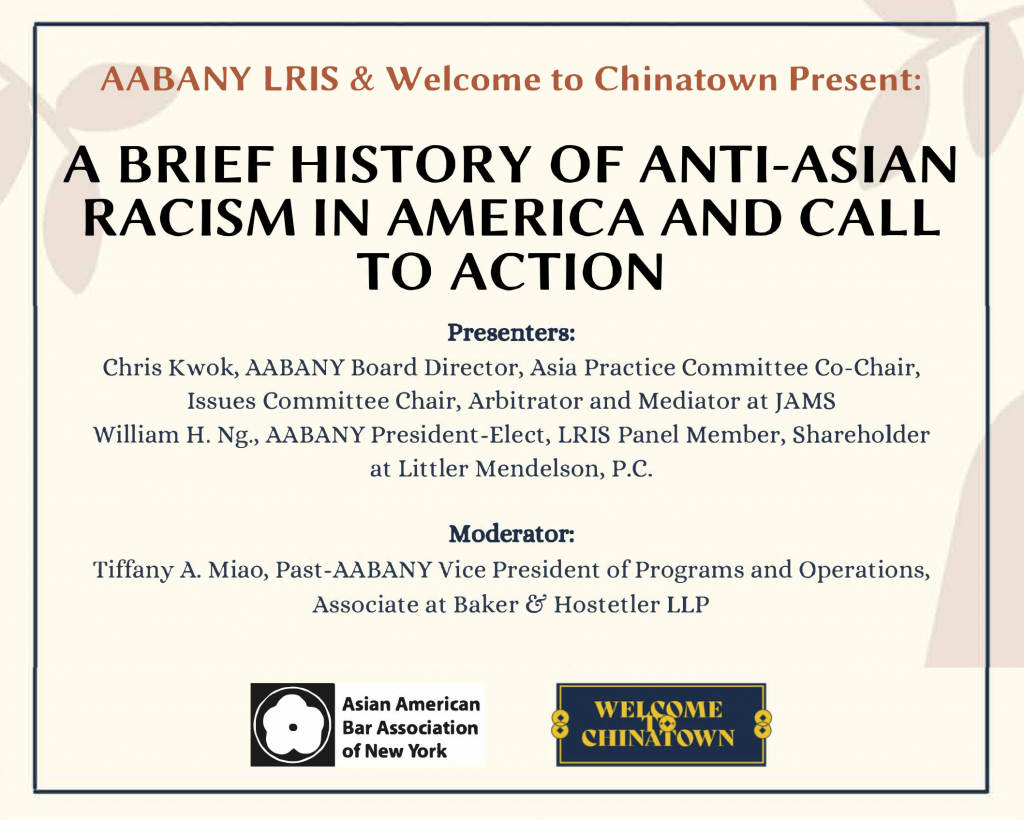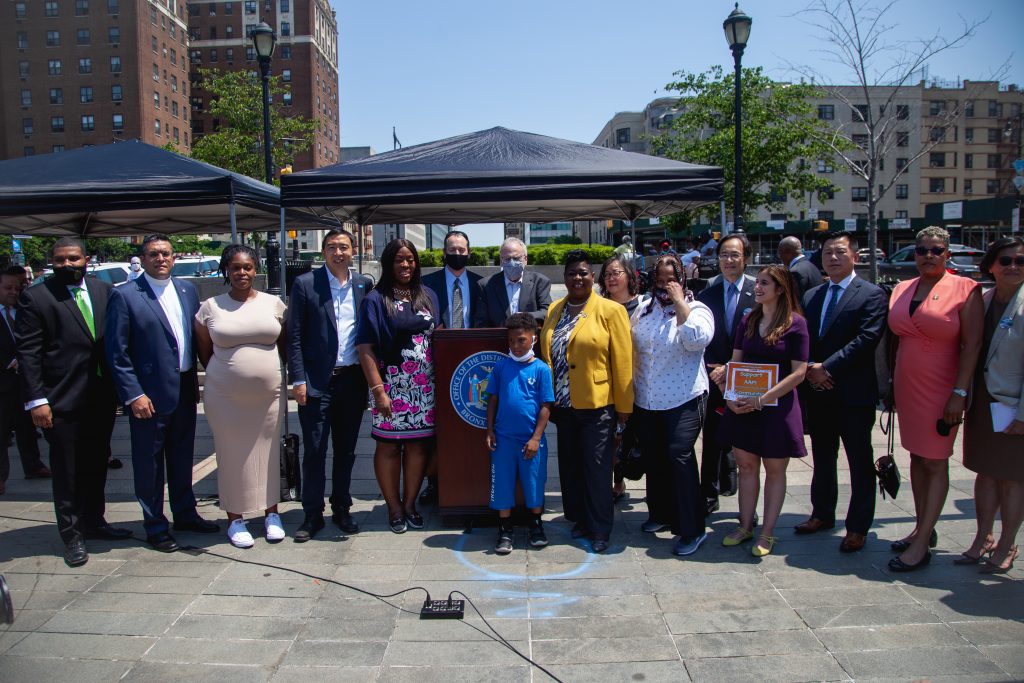
On May 25, the Asian American Bar Association of New York’s Anti-Asian Violence Task Force (AAVTF) hosted an information briefing about the AAVTF’s activities and about the rise in anti-Asian violence during the COVID-19 pandemic. The speakers for the event were AABANY President Terry Shen; Board Director, Issues Committee Co-Chair and Asia Practice Committee Co-Chair Chris Kwok; Board Director and past Pro Bono & Community Service (PBCS) Committee Co-Chair Karen Yau; PBCS Committee Co-Chair Karen King; Prosecutors’ Committee Co-Chair Joseb Gim; and Executive Director Yang Chen.
Chris and President Shen gave the opening remarks, introducing the event, and thanking all the attendees for coming.
After these remarks, Chris began the presentation, explaining how the publicity about anti-Asian violence generated in mainstream media has suddenly catapulted Asian American and Pacific Islanders (AAPIs) into the public consciousness. Unlike before, Asians are now viewed as a group that experiences discrimination and violence, just like any other minority. Chris explained that these realizations politically empower AAPIs to make change in the political system as Asians become more aware about race and the ways in which it affects them. The AAPI identity has also been recreated through artwork, publications, and other initiatives. Asian non-profits have also begun receiving a large influx of donations that have great potential to aid the AAPI community. Chris also discussed the history of AABANY’s report and how Trump’s inflammatory rhetoric about the virus incited a wave of anti-Asian hate and violence during early 2020. These events culminated in the report’s publication in February 2021. Karen then discussed the report’s publication process which involved the feedback and support of bar associations, law firms and other organizations. The subsequent publicity generated by the report was cemented by the anti-Asian shootings in Atlanta. Ever since, Karen explained, AABANY has frequently been requested to speak at numerous events and on many media outlets. Many initiatives proposed by the report have also since been implemented.
Yang then went on to discuss the genesis of the AAVTF, made up of members of the Academic Committee, Issues Committee, Legal Referral and Information Services (LRIS) Committee, PBCS Committee, Prosecutors Committee, and Student Outreach Committee as well as Immediate Past President Sapna Palla, President Shen, and President-Elect Will Ng. Yang also explained how the AAVTF was founded to realize the goals outlined in the report, focusing on three prongs of action: education/communication, research, and advocacy. Ever since, the AAVTF has pressed for hate crime prosecutions in DA Offices, published Know Your Rights Brochures for community members on what to do if they face an anti-Asian bias incident or hate crime, organized speaking engagements, begun data tracking for incidents, formed the Hate Eradication Active Response Team (HEART), and much more to raise awareness and combat anti-Asian violence.
Joe Gim, prosecutor and the Chief of the new Hate Crimes Bureau at the Nassau County DA Office next discussed the role of the Prosecutors’ Committee in the AAVTF, which was primarily to shed light on criminal statutes and on the gaps between law enforcement’s understanding and implementation of these statutes. This information, Joe explained, is used to strengthen AABANY’s initiatives and advocacy efforts.
Chris affirmed this statement, reiterating his thanks to the AAVTF and the indispensable support it provides in leading the conversation about anti-Asian violence. Chris also pointed out that any movements that fight back against hate, regardless of which group is targeted, are fighting against a common enemy of structural racism.
Yang and Karen Yau went on to promote the Turning the Tide (T3) Project, which is hosted at the Asian American Law Fund of New York (AALFNY) to raise money for the AAVTF’s initiatives, research, and advocacy combating anti-Asian hate and violence. Karen King also gave a special shoutout to the HEART initiative, encouraging the attendees to volunteer their time to help connect victims of anti-Asian violence with legal aid and other resources. She also encouraged attendees to involve their law firms as sponsors for projects and events.
Chris then closed the presentation by pointing out how the police’s lackluster response to hate crimes is in part due to the historical invisibility of the AAPI community. He also explained how this invisibility has its roots in the 1853 People v. Hall case where George Hall, a white man, was convicted but then released after murdering a Chinese miner. Chris explained how Hall appealed his release on the basis of a California statute which prevented people of color from testifying against whites. Chris also emphasized that supporting the Black Lives Matter movement does not detract from support for the AAPI cause. To illustrate the importance of building a multi-racial coalition, Chris recounted an interview he had with the celebrated documentary director Spike Lee for his film about New York City and race that will be released in September 2021. Lee explained that he had chosen to interview Chris because “people were asking where the Asians were. And I listened.”
After the presentations, the discussion was opened to the attendees for a question and answer session.
Karen Lin, PBCS Committee Co-Chair asked whether or not AABANY would advocate for including AAPI history in the public school curriculum. Yang answered by reiterating AABANY’s support of any educational initiatives, pointing to AABANY’s trial reenactments project as an example.
AABANY member Jennifer Luo then pointed the discussion towards the lack of successful hate crime prosecutions. Joe explained that law enforcement currently lacks sufficient resources and infrastructure to investigate hate crimes. As hate crimes are unique in that the prosecutor must prove that the perpetrator was motivated to commit the crime due to racial bias, this process requires more investigation and information which the police currently lacks. To address this issue, Joe also proposed creating a database of hate crimes and bias incidents that would allow law enforcement to easily access information and also to enable community members to report incidents more efficiently. He also mentioned the newly minted COVID-19 Hate Crimes Act, which would allocate funding towards combating hate crimes. Chris also added that AABANY is planning a Candidates’ Forum that would give AABANY and its members an opportunity to ask about measures being considered to protect the AAPI community from violence.
David Ahn then asked about AABANY’s plans to monitor hate crimes going forward. Chris answered by citing AABANY’s involvement in a case in Flushing, Queens where the perpetrator, despite revealing his racist sentiments in a text sent to the New York Times, was not charged with a hate crime. After AABANY’s advocacy in the DA’s Office, the perpetrator was charged with a hate crime. Chris also added that, though not every case would lead to a hate crime enhancement, AABANY is continuing to monitor the news and other outlets for advocacy opportunities. Yang also explained that the HEART initiative would help AABANY keep track of the incidents, connect with the community, and improve AABANY’s advocacy efforts. Karen Yau also pointed out that there are other alternatives to criminal prosecutions that victims would be able to pursue if they wished.
Chris then shared his own experiences with anti-Asian violence growing up, recounting a story where his friends were assaulted by a white supremacist gang while exiting a movie theater in Queens. He also described his efforts to reconnect with them hoping to preserve their stories and voices as a part of the history of anti-Asian violence.
AABANY Treasurer William Hao also discussed his own involvement in the aftermath of the Atlanta shootings while on a call with former U.S. Attorney Byung J. (“BJay”) Pak, the FBI, and local law enforcement. Will shared that even though the media had severely twisted the narrative by promoting the perpetrator’s claim that he had not been motivated by racism, the call served to give Asians a voice in revealing the truth of the events and reshaping the story. Will concluded by emphasizing the importance of AAPI representation in government and law enforcement.
Marilyn Go (USMJ EDNY, ret’d) then asked about AABANY’s ability to speak out during majority political forums. Chris answered by pointing out the difficulty of entering majority forums, but also noted that events recorded on Zoom would allow AABANY to hold candidates accountable for their words. Yang also referenced the City Council District One Candidates’ Forum which did take questions from AABANY regarding the NYPD Hate Crimes Task Force. Jennifer then asked about the possibility of keeping a record of candidates’ responses regarding issues of anti-Asian violence. Chris responded that AABANY’s future plans to hold a Manhattan DA Candidates’ forum would allow AABANY to record responses from the candidates on that issue.
AABANY thanks all of the attendees for their time and their commitment to serving the AAPI community. To view the recording of the event, click here.



 Amanda Jimenez
Amanda Jimenez Evelyn (Meng) Lin
Evelyn (Meng) Lin Shelley Wu
Shelley Wu Dawa Lhamo
Dawa Lhamo
